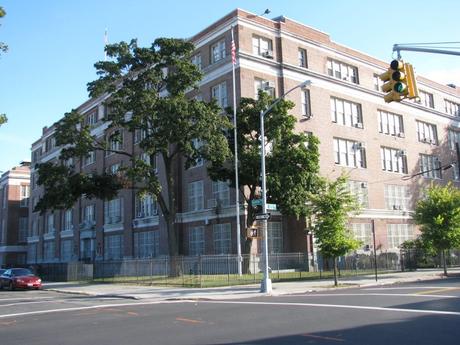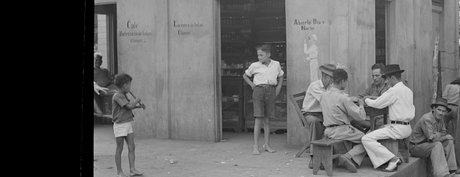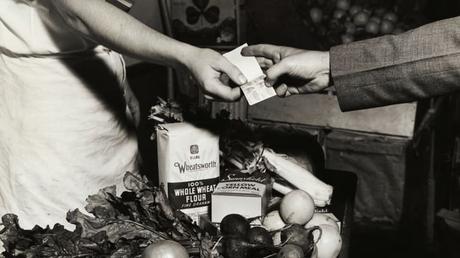
"Santiago Delacruz!"
Sonny winced. Oh, how he hated that name. He would much rather have people call him "Sonny" than "Santiago." "Sonny" was more American sounding. Worse, he hated the fact that he was Puerto Rican. Technically speaking, Sonny was American, but he wanted to be American-born and all the way, José.
Sonny was out of luck. He could never live down the indisputable fact that he was not a native "Nuyorican." He was a transplant. And there was nothing he could do about it. His parents were also from Puerto Rico, or "La Isla del Encanto," that little Caribbean Island of enchantment. There was nothing he could do to change that either.
Mami bragged to her American vecinos that she had come from the big city of Santurce, while Papi - she always looked at him sideways when she said this - he was from Bayamón.
They were married in Ponce.
"Don't ask," she would insist when the neighbors greeted this pronouncement with puzzled looks. With hardly any prodding, Mami would tell them the story of their nuptials. "It was the relatives, they were to blame, tu sabe? You know how relatives are. They stick their noses into everything." Uh-huh. We know.
Mami, whose married name was Juana Beatriz De La Vega Baja, loved Papi to death. That's what Sonny's aunts would say. Sonny had a hard time believing that. Not so much for the way Mami treated him, but for the way Papi treated her. Not a day went by without their getting into an argument. It didn't matter what day. It didn't matter what time, or where. They would argue about this, they would argue about that. It made no difference. It was expected that, before the sun would make up its mind to set, they would have fought about something - anything - as part of their daily routine.
Papi's parents christened him Juan José Fulgencio (after his mother's grandfather) De La Cruz Prado (his father, Santiago's abuelo, had a poetic streak). About thirty years ago, the family name was shortened to Delacruz - "To make it simpler to spell," said Papi, amused by his little pun. Papi's close friends liked to call him Pito - short for Pepito, short for José. That's Papi for you: always coming up short.
"Pepito, hah! That's what they used to call him," Sonny smiled to himself. As a teenager, growing up in Bayamón, all Papi heard, all day long, was the nickname "Pepito, Pepito, Pepito!" Nobody called him that anymore. Just Pito, thanks.
Sonny had a little brother, Juanito, or Juan Jr. How "little" was little brother Juanito? To be accurate, not by much. A year and a couple of months, maybe a few days in between. They were practically twins - that is, when they were small. Little kids, tiny, defenseless. Not anymore.
Juan Pedro Delacruz Vega was a smart cookie. Oh, yeah, definitely the smart one, the brains of the Santiago outfit. A lot sharper than Sonny ever was, but that's according to Papi. Sure, he would know. He always knew. Juanito won all sorts of honors, in primary school, in junior high school - what, in some places, they call middle school - all the way up to James Monroe High School.
"Mustn't forget college," Sonny would toss in, anytime a friend or a relative asked Mami about their schooling. Both boys were accepted to Fordham University in the Bronx, but that was as far as Sonny got. Juanito, however, continued on with his education, all the way up to Columbia University and Teacher's College in Manhattan; from there, on to Syracuse University in upstate New York, and, finally, to the University of Rochester where he took up an assistant professorship in their renowned Chemistry Department. All on scholarships and merit. How about that?
"A free ride on brains," Sonny would add.
Juanito had so many advanced degrees he could have hired himself out as a thermometer. That was Sonny's little "in-joke" around his brother's high IQ. It didn't go over well with the relatives. Sonny's jokes never went over well. "Shit! Must've gotten lost in the translation," he would mutter to himself.
What did Sonny think about school? And what did he get out of it all? "A pat on my freaking behind, that's what." He quickly threw in, "Good luck with that. Yeah, but you know, at least it was something."
Was he resentful of his brother's high IQ, his facility with numbers, his good fortune? No, not exactly. Sonny never felt resentment. Not even a little bit, which was unusual.
"No, really, it's true. I'm proud of Juanito," Sonny would boast to his friends. "He's a real good kid." Yes, indeed, a real good kid. Well, too damn good. Kind, considerate, obedient to his parents, deferential to his elders; the kind of kid who rarely got into trouble. The kind of kid any mother could love, and most fathers would be proud of. But that was all "surface noise," as Sonny recalled.
Years later, Juanito confessed to his brother that his life was as hard and full of problems for him as it was for Sonny and his parents. But he never felt that Sonny was anything less than a brother to him, or that he was superior to Sonny in any way. It was like that with close siblings. They would always defend one another, to the death if need be. They could justify whatever the other happened to do, be it for good or for bad. In each of their dark-brown eyes, one was never less than the other; the brotherly bond that existed between them never subsided but was always respected. Because, God forbid, there might come a time when brother would need brother. And who do you turn to when things get out of hand?

"Santiago! Santiago Delacruz!"
Once again, Sonny cringed when he heard his name shouted out in school. It was torture for him whenever a new school year began. That's when the teachers would conspire, in his agile mind, to mangle his moniker in front of all his classmates. Chuckle, chuckle. Giggle, giggle.
Sonny felt crushed under the weight of a foreign-sounding name. Worst of all, he grew steadily embarrassed, ashamed, humiliated, or all three, at what became an annual roast. The painful doors of reality would start to open up before him when teachers called out his name to all concerned - and unfailingly mispronounced it.
"Butchered! Murdered! Eviscerated to death!" Sonny would lash out. "Cruel and unusual punishment, that's what it is!" Sonny wanted to crawl under his desk and hide, the way chocolate-colored cockroaches did when they scurried for cover in his family's bathroom or kitchen. Rot away to nothing, that's what Sonny felt like doing. That'll teach those freaking buggers!
"Mess with me, will you? I'm better off dead, man. Maybe then, they'll stop bugging my ass." Yeah, right.
"San-, San-tie-, San-tie-YAY-go?"
"Did somebody say San Diego?" Sonny mumbled irritably. "Ugh, mierda, what torture! Dang it, why can't these gringos call my freaking name the way it's supposed to be called?"
At recess, Sonny went on a tear about his pet peeve to his classmates Ralphie, Nelson, and Vinnie.
"What's so ding-dang hard about making each distinctive vowel sound, pronouncing each and every syllable, separately and clearly? Can you tell me that?"
"They teach you all this grammar and stuff in English class, you know?" answered Ralphie.
"Yeah," Vinnie piped in, "about freaking vowels and consonants, the silent 'e', except after 'c', like fucking cunt and shit."
"Yeah," agreed Nelson, "but when it comes to your name, man, that all goes out the freaking window."
"Damn straight! Screw it, man! Goddamn teachers drive my ass crazy with this shit." Sonny wanted to croak, "Like a shit-ass, come mierda frog. ¿Comprende? Let me die in my sleep," he cried. "Let me wither away under my writing desk."
At junior high school, those brown, wooden-shaped, metal-framed atrocities the teachers described as "desks" came from sometime in the 1950s, the so-called "dark ages" (or earlier, for all anybody knew). The desks were bolted permanently to hardwood floors, immovable, implacable, and irreplaceable, objects as old as the pyramids, the symbol of an unchanging, unfeeling bureaucracy. Welcome to the new school year, folks!
Why was Sonny thinking about this rubbish? Him, an inner-city kid in the eighth grade? Did he believe all that garbage he was spewing to his friends and that they spewed back at him? No, not for a minute. But Sonny had come to that conclusion whenever his mind wandered back to those humiliating experiences of his youth; one that he and his companions were forced to go through every day of their lives. To be repeated endlessly, at the start of every school year. Start, stop, rinse, repeat. It was worse than being trapped inside a washing machine.
Public school was supposed to be the pride and joy of "Noo Yawk Shitty." That's what everybody thought of the Big Manzana (actually, by Sonny and his buddies). The shining beacon of the modern 1960s public school system, a fountain of knowledge to those in desperate need of it, had not lived up to these standards. And in many ways, it was all that. But, in equal measure, it really wasn't. The school system had a lot to overcome, even then, even now.
To begin with, there were far too many kids in the city's public school system, most of them from poor and working-class families, some of whose parents lived off Welfare, the term people used to describe public assistance.
"Relief, I think that's what they called it," remembered Sonny. Relief? Relief from what? From misery? Pain? Financial problems? All three maybe?

Food stamps, that's what families on relief were supposed to receive, and what they relied on. Stamps to buy their meals with, stamps for cigarettes, stamps for milk and bread. Usually purchased at the local grocery store. Mami shopped for a time at the old Hills Brothers Supermarket, a few blocks away from their Stratford Avenue apartment. When Hills Brothers went out of business in the mid-1960s, Mami switched to the nearby A&P, whatever those letters stood for. Some folks were getting subsidized housing, too, in many of those Public Housing Projects down the street.
It took the Delacruz family some time - nearly seven years by the Christian calendar - before they had gone down that trying road. Seven bad years. Despite their struggles, Papi never felt his family needed to rely on food stamps to ensure their survival, but they sure might have helped. Honestly, Papi never asked for food stamps. He was a proud man who refused to take the barest hint of a handout from anybody. Food stamps? Help with the rent? Not if he could help it. He had limited means, this was true, but he would rather sell off whatever material possessions he had than take charity from some crappy city agency.
That's how Papi was. Proud, always proud. Maybe too damn proud.
Copyright © 2022 by Josmar F. Lopes
